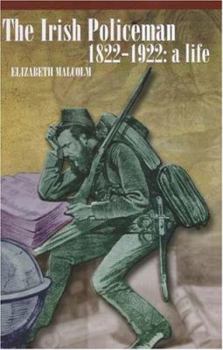The Irish Policeman, 1822-1922: A Life
This book analyzes the working and domestic lives of the nearly 90,000 men who served in the Irish police between the establishment of a national constabulary in 1822 and the disbandment of the Royal... This description may be from another edition of this product.
Format:Hardcover
Language:English
ISBN:1851829202
ISBN13:9781851829200
Release Date:January 2006
Publisher:Four Courts Press
Length:266 Pages
Weight:1.30 lbs.
Dimensions:1.2" x 6.3" x 9.3"
Customer Reviews
1 rating
The life of the Irish "peeler"
Published by Thriftbooks.com User , 16 years ago
During the last century of British rule in Ireland, no symbol of their authority was more ubiquitous than the Royal Irish Constabulary. Created to keep the peace, its members were stationed in every county and community on the island. Though there are numerous studies examining their role in policing Ireland, Elizabeth Malcolm's book focuses on what she terms "the social history of policing," looking at the lives and careers of the men who wore the uniform of the RIC. Malcolm begins with a summary of the early history of policing in Ireland. Though police forces were an innovation largely of the nineteenth century, she summarizes the functioning of brehon law and the introduction of English practices in the fourteenth century, as well as the experiments with peace maintenance forces in the eighteenth century that predated the Irish Constabulary Act of 1836, the legislation that created what came to be the RIC. From here she breaks down service within the RIC into a number of components, looking at the organization and composition of the force, its training and duties, life within its ranks, and departure and retirement. From Malcolm's approach, an understanding of the RIC and its role emerges. Men were drawn to serve within its ranks by the promise of regular pay and the prospect of a pension in their old age - both attractive propositions in an impoverished agricultural economy such as Ireland's in the nineteenth century. The force primarily drew constables from the families of small farmers into its ranks, with an officer corps consisting of men from the upper ranks of society. Their training was modeled upon that of the military and reflected the goals behind the RIC's creation, which was social control rather than law enforcement. Yet as the force matured its members took on a variety of roles, from information collection to officers of the court, as well as the traditional ones of policemen investigating crime. Using an impressive wealth of sources, Malcolm's book reveals a fascinating dimension to the history of Irish policing. Buttressed by quotes from the constables, officers, and family members who made up the force, it offers insight into the Irish "peelers," giving life to these iconic figures and understanding of the choices they made. This is a work that should be read by anyone interested in the men who personified British rule in Ireland and how they enforced it.





